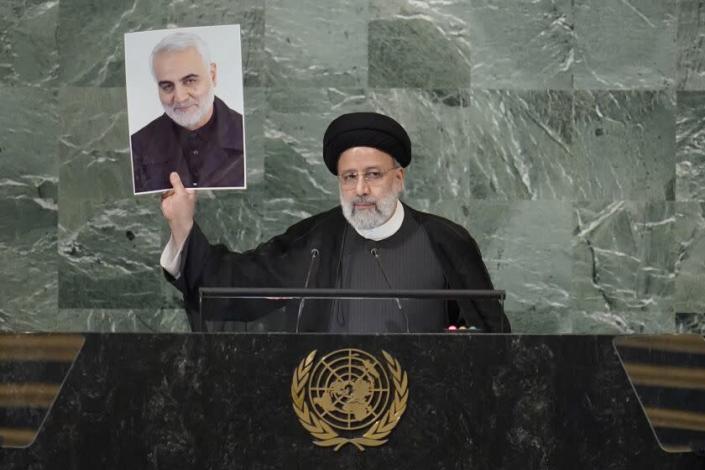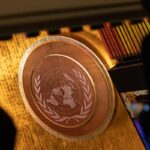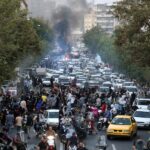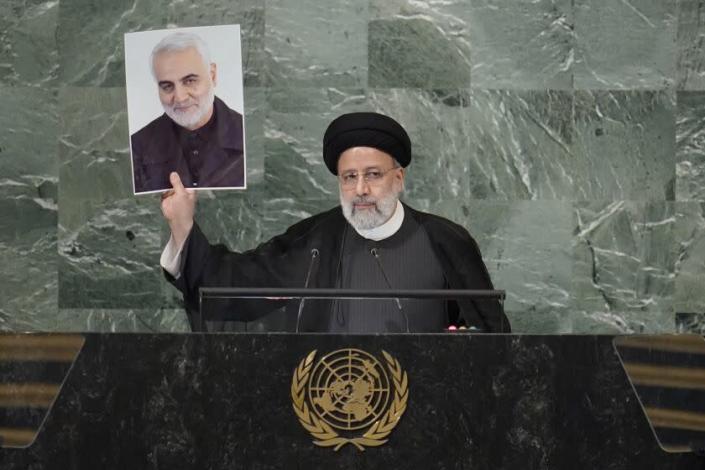
Signaling that the Russian war in Ukraine has triggered an existential crisis for the United Nations, several of its key members on Thursday harshly denounced Moscow’s actions, but failed to take new steps to stop the bloodshed and food, energy and humanitarian crises unleashed worldwide.
And in a separate action, the Biden administration imposed economic sanctions Thursday on Iran’s notorious “morality police” in response to the death of a young woman in their custody. The unusual move by the U.S. — sanctions typically target military and political entities, not social-control bodies in Iran — came a day after Iranian President Ebrahim Raisi addressed the U.N. General Assembly.
Raisi sought to deflect international outrage amid widespread street protests in Iran over the death of Mahsa Amini, an Iranian Kurd who was reportedly arrested because her government-obliged headscarf failed to completely cover her hair. Raisi refused to acknowledge any wrongdoing, citing instead the human rights abuses of the U.S. and other Western countries.


Iran’s morality police are men who enforce dress codes and other restrictions on women and broader society. The new U.S. sanctions include some law enforcement figures in response to Iran’s crackdown on the protests over Amini’s death — repression that has killed several more people.
“The Iranian government needs to end its systemic persecution of women and allow peaceful protest,” U.S. Secretary of State Antony J. Blinken said. “The United States will continue to voice our support for human rights in Iran and hold those who violate them to account.”
Accountability, whether for Iran over punishment of dissent or for Russia over alleged atrocities in Ukraine, was front and center at this week’s annual U.N. General Assembly as participants discussed a world mired in seemingly insurmountable troubles.
With leaders from around the world convening in New York, delegates used an extraordinary meeting of the United Nations Security Council, the U.N.’s governing body, to chastise Russian President Vladimir Putin for breaking key international rules — those at the foundation of the U.N. — in his ruthless assault on Ukraine.
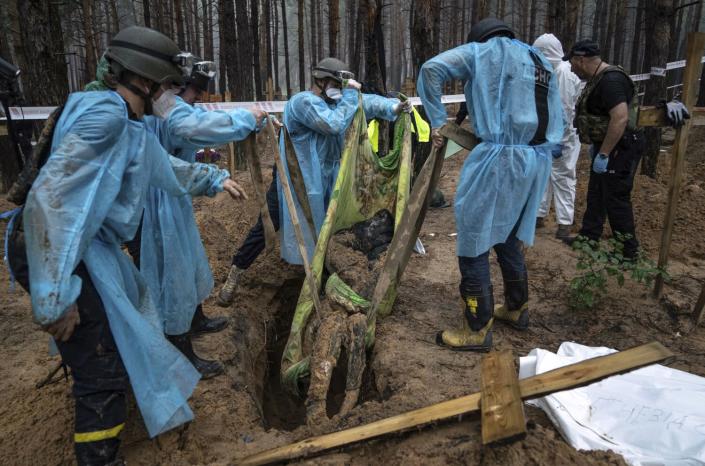

Russia “is violating the very rules this body was created for,” said the foreign minister of Lithuania, Gabrielius Landsbergis, in one of a catalogue of speeches delivered by the council’s 15 members and Ukraine.
In a show of support for Ukraine, Landsbergis wore a blue-and-yellow wristband — the colors of its flag — with his dark suit.
“The very international order that we have gathered here to uphold is being shredded before our eyes,” Blinken said. “We cannot — we will not — allow President Putin to get away with it.”
Yet if the U.N. is seen as increasingly ineffective, it is unclear how world leaders should confront multinational challenges.
Thursday’s General Assembly session was convened to discuss peace and security in Ukraine and the issues of impunity and accountability. For most delegations, that meant holding Russia accountable for invading Ukraine and allegedly committing atrocities in numerous Ukrainian towns and regions.
Moscow’s representative, however, said Ukraine had enjoyed impunity and should be blamed.
Russian Foreign Minister Sergey Lavrov used his comments to turn the war narrative on its head, repeating Moscow’s contention that the conflict was Ukraine’s fault because of what he called the abuse and repression of Russian speakers and ethnic Russians in eastern Ukraine, where Moscow-backed separatists have operated for several years. And he repeated the Russian assertion that the massive nation is the one under military threat, from Ukraine and its Western backers.
“Of course, the Kyiv regime,” Lavrov said, implicitly refusing to recognize the legitimacy of the Ukrainian government, “owes its impunity to its Western sponsors, first of all Germany and France but also the United States.
“Particularly cynical is the states that are pumping Ukraine full of weapons, and training their soldiers,” he said, with the goal of “dragging out the fighting as long as possible in spite of the victims and destruction, in order to wear down and weaken Russia.”
There had been speculation among U.S. officials that Lavrov might not attend the session to avoid the expected barrage of criticism. He appeared shortly before his turn to speak and left immediately afterward.
British Foreign Secretary James Cleverly, who recently took the job when Liz Truss was named to replace British Prime Minister Boris Johnson, described Lavrov’s characterization of the war as “Russia’s catalogues of distortions, dishonesty and disinformation.”
In a dig, Ukrainian Foreign Minister Dmytro Kuleba said after Lavrov departed the chamber that Russian diplomats seem to flee as quickly as their soldiers. It was a reference to reports of massive desertions by troops deployed by Putin ahead of Ukrainian advances.
The Biden administration has sought to shore up support for Western-led efforts to arm, train and back Ukraine in its war with Russia. Some countries that rely on Russian weapons or fuel, such as India, have been reluctant.
In Thursday’s speeches, Blinken and others portrayed the war as a tragedy that goes far beyond Ukraine and Europe, affecting the Global South and countries in Asia and Africa that were cut off from food supplies when Russia blockaded Ukraine’s Black Sea ports and its shipments of millions of tons of grain, fertilizer and cooking oil.
“At the global level, the conflict has supercharged a triple crisis of food, energy and finance,” U.N. Secretary-General Antonio Guterres said in convening the meeting.
“This is driving millions more people into extreme poverty and hunger and reversing years of progress in development,” he said, citing problems exacerbated by the COVID-19 pandemic and the climate crisis.
Especially critical, Guterres, Blinken and other diplomats say, is Russia’s violation of the U.N. Charter, its foundational documents, by using force to attempt to take over a sovereign neighboring country. Both President Biden and Ukraine’s President Volodymyr Zelensky also denounced this abuse by Putin and suggested that Russia be stripped of its veto powers in the Security Council.
But no such action was taken Thursday, and it is not clear whether there is a mechanism for stripping those powers. Binding international sanctions against Moscow are next to impossible to put in place through the U.N. due to Russia’s veto powers, which have allowed the country to block punitive actions against it.
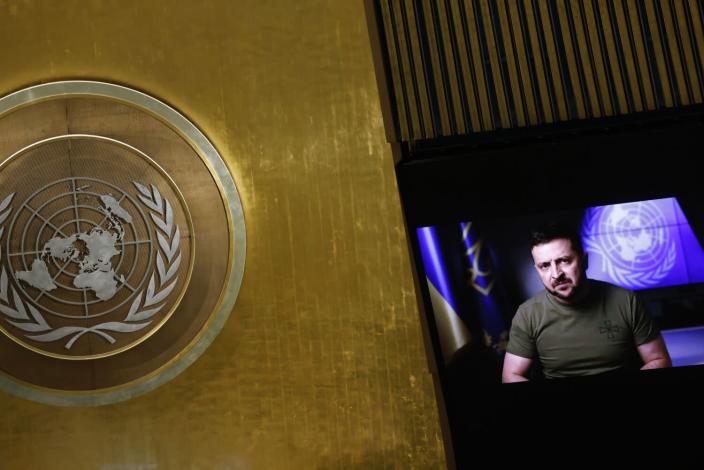

“Defending Ukraine’s sovereignty and territorial integrity is about much more than standing up for one nation’s right to choose its own path, fundamental as that right is,” Blinken said Thursday. “It’s also about protecting an international order where no nation can redraw the borders of another by force.
“If we fail to defend this principle when the Kremlin is so flagrantly violating it, we send a message to aggressors everywhere that they can ignore it, too,” he continued. “We put every country at risk. We open the door to a less secure, a less peaceful world.”
Blinken and others noted that far from standing down or seeking a diplomatic solution, Putin this week chose to order tens of thousands more Russians into the battle at the very time the world’s leaders were meeting at the U.N.
“This is a war you will not win,” German Foreign Minister Annalena Baerbock said, addressing Putin without naming him. “Stop sending more of your own citizens to their deaths…. Stop driving hunger around the world…. Stop paralyzing this [U.N.] body.”
This story originally appeared in Los Angeles Times.

